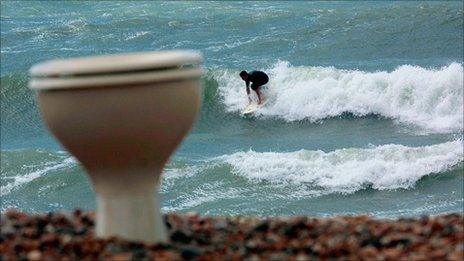Bournemouth Pier in Dorset 'highest' for sea sewage
- Published

Wessex Water discharged raw sewage at Bournemouth Pier 16 times in 20 weeks
Surfer Andy Cummings can tell quickly when he's surrounded by raw sewage because: "It smells and tastes a bit sweet."
He no longer comes across floating condoms or sanitary goods thanks to sewer filters, but the "smell and taste is unmistakeable and you know you need to get out as soon as possible".
Mr Cummings is also campaign director of the pressure group called Surfers Against Sewage (SAS).
Its sewage discharge alert service launched in May has highlighted the amount of times raw sewage has been discharged from Combined Sewer Overflows (CSOs) near beaches around England and Wales during the bathing period, 15 May to 30 September.
The most frequent raw sewage discharges were at Bournemouth Pier and Shore Road, both in Dorset, with 16 discharges each during those 20 weeks.
Heavy rainfall
There were 13 discharges each at Mudeford Sandbanks in Dorset, Summerleaze in Cornwall, Meadfoot in Devon and Saltburn in North Yorkshire.
Clevedon beach in Somerset had 10 spills, South Sands in Devon and Crantock in Cornwall had nine, while Swanage Central in Dorset had eight.
A CSO acts as an emergency outlet triggered by intense and heavy rainfall and discharges raw sewage and rainwater into the sea.
The Environment Agency (EA) grants consent for an average of three discharges a year onto a designated beach over a ten-year period.
Christine Tucker, head of water quality at EA, said: "We need to look into what has happened."
She added that EA can take action against water companies if discharges occurred during inappropriate periods, such as dry weather.
'Intense storm'
Mr Cummings, who has surfed for 15 years, said pathogens in the sewage has led him to suffer serious bouts of gastroenteritis. They can also cause ear, nose and throat infections.
"It's not something I'd wish on my worst enemy," he said.
He added: "The water companies need to make sure their sewage system is working effectively so it can take the volume of sewage it's designed for."
Wessex Water said one of the reasons for the discharges at Bournemouth Pier was "the intense storm" on 18 August.
Spokeswoman Lucy Piercey said: "The overflows were operated during heavy rainfall to help protect properties from flooding and preventing sewage backing up into the street and homes."
She added: "We will examine the points raised by SAS immediately."
- Published29 June 2011